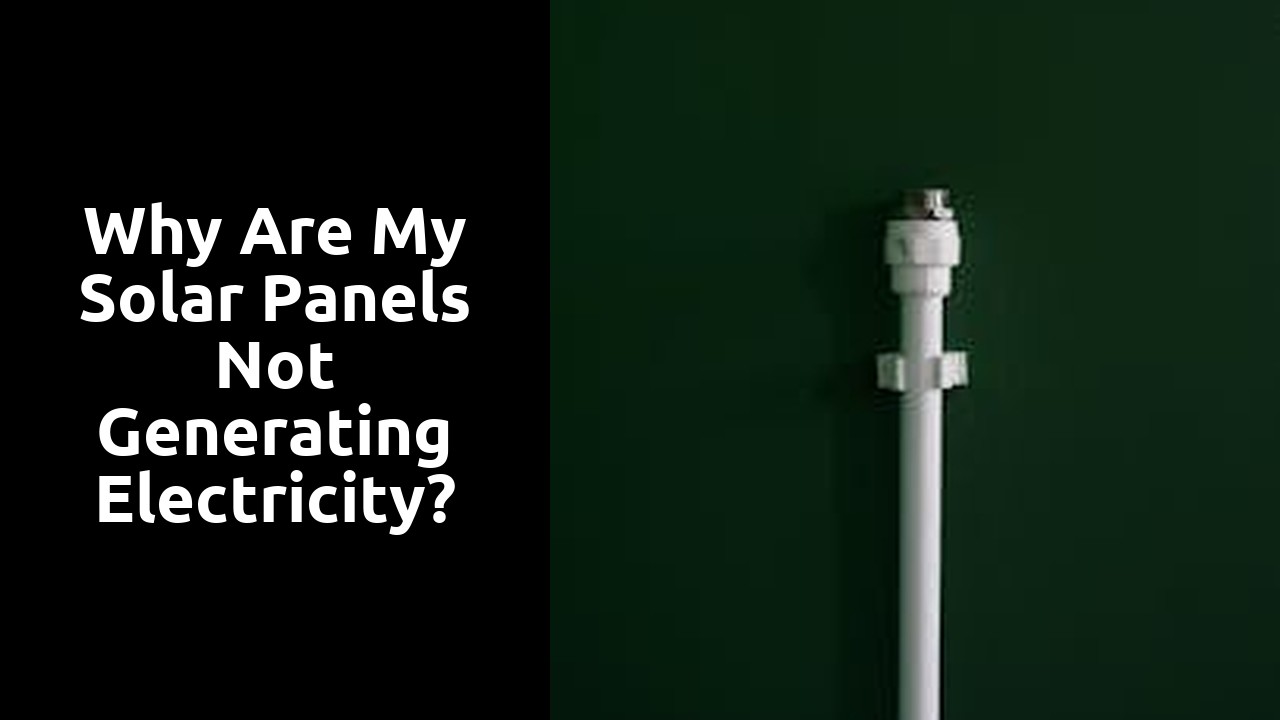Why are my solar panels not generating electricity?

Electrical Wiring Problems
Electrical Wiring Problems in a solar panel system can often lead to a halt in electricity generation. If you find that your solar panels are not producing electricity as they should, it is crucial to investigate the wiring in your system. Faulty connections can disrupt the flow of electricity and inhibit the panels from generating power efficiently. These issues are common in Solar Panel System Troubleshooting and need to be addressed promptly to restore the system's functionality.
Ensuring that the wiring connections in your solar panel system are secure and free from any damage is essential. Loose connections or exposed wires can impede the performance of the system and cause a decrease in electricity production. Regular inspection of the wiring, especially after extreme weather conditions, can help detect any potential problems before they escalate. By maintaining the integrity of the wiring in your solar setup, you can optimise the system's output and guarantee a continuous supply of clean energy.
Look for Faulty Wiring Connections
Faulty wiring connections are a common issue that can hinder the performance of solar panel systems. To address this problem, it is crucial to conduct a thorough inspection of all wiring components to check for any signs of wear, damage, or loose connections. This step is essential in ensuring the efficiency of the system and maintaining a steady flow of electricity generation. Additionally, make sure to inspect both the DC and AC wiring connections to identify any potential areas of concern.
When troubleshooting faulty wiring connections in a solar panel system, attention to detail is key. Carefully examine all junction boxes, connectors, and cables for any visible signs of damage or corrosion. It is also important to test the voltage at various points along the wiring to pinpoint any areas where there may be a drop in power output. By diligently inspecting and testing the wiring connections, you can detect and rectify any issues that may be impacting the overall performance of the solar panel system.
System Overload
System Overload
When experiencing issues with your solar panels not generating electricity, it is crucial to assess whether the system is overloading. Solar panel systems are designed to operate within a certain capacity, and exceeding this limit can lead to a disruption in electricity production. To troubleshoot this problem, check if the demand for electricity in your household or facility is exceeding the system's capacity to generate power.
An overloaded solar panel system can result from adding too many appliances or devices that draw power simultaneously. Carefully evaluate the power consumption of your appliances and consider redistributing your energy usage to prevent overloading the system. By conducting a thorough assessment of your electricity needs and the capacity of your solar panel system, you can ensure efficient energy production and prevent disruptions in power supply. Remember, proactive monitoring and adjustment are key aspects of effective Solar Panel System Troubleshooting.
Check if the System is Exceeding Its Capacity
When assessing why your solar panels are not generating electricity, it is crucial to check if the system is exceeding its capacity. An overloaded system can lead to inefficiency and a lack of power production. Solar panel systems have specific capacities they can handle, and exceeding this limit can result in poor performance.
To determine whether your system is operating beyond its capacity, it is recommended to consult the product specifications provided by the manufacturer. Understanding the maximum output the system can handle is essential for troubleshooting issues related to electricity generation. In cases where the system is being overloaded, adjustments may need to be made to ensure optimal performance. Solar Panel System Troubleshooting is integral to resolving capacity-related issues and ensuring the efficient operation of your solar panel system.
Inefficient Panel Positioning
Inefficient Panel Positioning can significantly hinder the performance of your solar panel system. It's crucial to assess the panel tilt and orientation to ensure maximum sun exposure and optimal electricity generation. Poor positioning can lead to decreased energy production, impacting the overall efficiency of your system. To address this issue, consider adjusting the angle and direction of your panels to align them properly with the sun's path throughout the day.
Solar Panel System Troubleshooting includes evaluating the surroundings of your panels. Ensure there are no obstructions such as trees or buildings casting shadows on the panels, as this can cause shading and reduce their effectiveness. Additionally, regular maintenance to keep the panels clean and free from dirt or debris is essential for efficient operation. By paying attention to the positioning of your solar panels, you can enhance their performance and maximise the electricity output of your system.
Assess Panel Tilt and Orientation for Maximum Sun Exposure
Assessing the tilt and orientation of your solar panels is crucial for maximising sun exposure and enhancing their efficiency at generating electricity. Properly positioning the panels ensures they receive the optimum amount of sunlight throughout the day. To do this, evaluate the direction the panels face to determine if they are angled towards the sun's path, typically north in the Southern Hemisphere. Adjusting the tilt angle according to your location's latitude can significantly boost energy production. By maintaining this alignment, you can make better use of sunlight and improve the overall performance of your solar panel system.
It is essential to monitor shading patterns caused by nearby objects such as trees or buildings that may obstruct sunlight from reaching the panels. A shadow cast on solar panels can greatly reduce their energy output. Regularly assess and trim any overhanging branches or consider repositioning the panels to mitigate shading risks to ensure optimal sun exposure. By fine-tuning the tilt and orientation of your solar panels, you can overcome shading obstacles and increase the efficiency of your system, ultimately troubleshooting your Solar Panel System Troubleshooting.